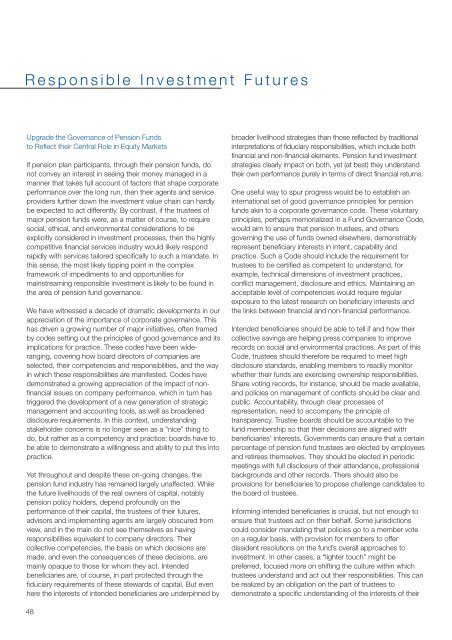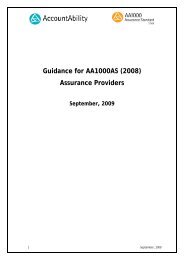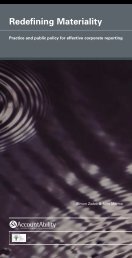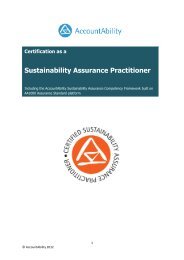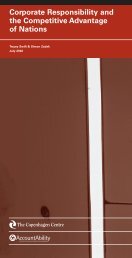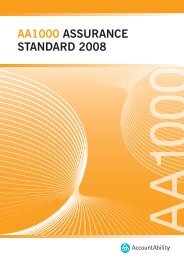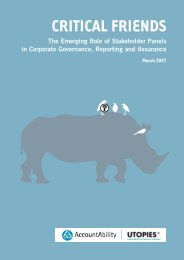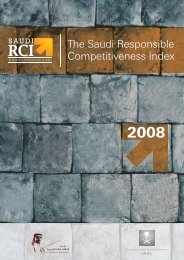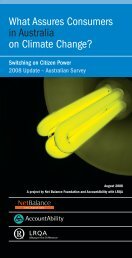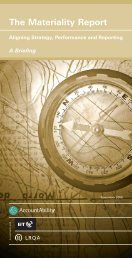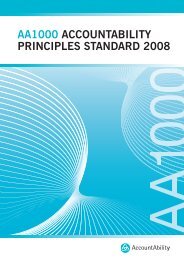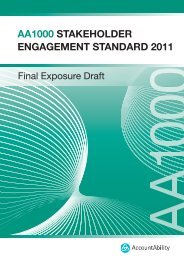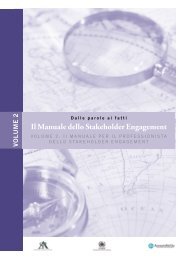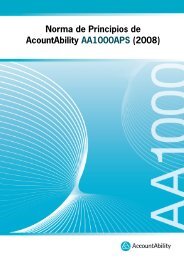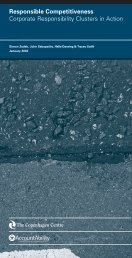Mainstreaming Responsible Investment - AccountAbility
Mainstreaming Responsible Investment - AccountAbility
Mainstreaming Responsible Investment - AccountAbility
Create successful ePaper yourself
Turn your PDF publications into a flip-book with our unique Google optimized e-Paper software.
<strong>Responsible</strong> <strong>Investment</strong> Futures<br />
Upgrade the Governance of Pension Funds<br />
to Reflect their Central Role in Equity Markets<br />
If pension plan participants, through their pension funds, do<br />
not convey an interest in seeing their money managed in a<br />
manner that takes full account of factors that shape corporate<br />
performance over the long run, then their agents and service<br />
providers further down the investment value chain can hardly<br />
be expected to act differently. By contrast, if the trustees of<br />
major pension funds were, as a matter of course, to require<br />
social, ethical, and environmental considerations to be<br />
explicitly considered in investment processes, then the highly<br />
competitive financial services industry would likely respond<br />
rapidly with services tailored specifically to such a mandate. In<br />
this sense, the most likely tipping point in the complex<br />
framework of impediments to and opportunities for<br />
mainstreaming responsible investment is likely to be found in<br />
the area of pension fund governance.<br />
We have witnessed a decade of dramatic developments in our<br />
appreciation of the importance of corporate governance. This<br />
has driven a growing number of major initiatives, often framed<br />
by codes setting out the principles of good governance and its<br />
implications for practice. These codes have been wideranging,<br />
covering how board directors of companies are<br />
selected, their competencies and responsibilities, and the way<br />
in which these responsibilities are manifested. Codes have<br />
demonstrated a growing appreciation of the impact of nonfinancial<br />
issues on company performance, which in turn has<br />
triggered the development of a new generation of strategic<br />
management and accounting tools, as well as broadened<br />
disclosure requirements. In this context, understanding<br />
stakeholder concerns is no longer seen as a “nice” thing to<br />
do, but rather as a competency and practice; boards have to<br />
be able to demonstrate a willingness and ability to put this into<br />
practice.<br />
Yet throughout and despite these on-going changes, the<br />
pension fund industry has remained largely unaffected. While<br />
the future livelihoods of the real owners of capital, notably<br />
pension policy holders, depend profoundly on the<br />
performance of their capital, the trustees of their futures,<br />
advisors and implementing agents are largely obscured from<br />
view, and in the main do not see themselves as having<br />
responsibilities equivalent to company directors. Their<br />
collective competencies, the basis on which decisions are<br />
made, and even the consequences of these decisions, are<br />
mainly opaque to those for whom they act. Intended<br />
beneficiaries are, of course, in part protected through the<br />
fiduciary requirements of these stewards of capital. But even<br />
here the interests of intended beneficiaries are underpinned by<br />
broader livelihood strategies than those reflected by traditional<br />
interpretations of fiduciary responsibilities, which include both<br />
financial and non-financial elements. Pension fund investment<br />
strategies clearly impact on both, yet (at best) they understand<br />
their own performance purely in terms of direct financial returns.<br />
One useful way to spur progress would be to establish an<br />
international set of good governance principles for pension<br />
funds akin to a corporate governance code. These voluntary<br />
principles, perhaps memorialized in a Fund Governance Code,<br />
would aim to ensure that pension trustees, and others<br />
governing the use of funds owned elsewhere, demonstrably<br />
represent beneficiary interests in intent, capability and<br />
practice. Such a Code should include the requirement for<br />
trustees to be certified as competent to understand, for<br />
example, technical dimensions of investment practices,<br />
conflict management, disclosure and ethics. Maintaining an<br />
acceptable level of competencies would require regular<br />
exposure to the latest research on beneficiary interests and<br />
the links between financial and non-financial performance.<br />
Intended beneficiaries should be able to tell if and how their<br />
collective savings are helping press companies to improve<br />
records on social and environmental practices. As part of this<br />
Code, trustees should therefore be required to meet high<br />
disclosure standards, enabling members to readily monitor<br />
whether their funds are exercising ownership responsibilities.<br />
Share voting records, for instance, should be made available,<br />
and policies on management of conflicts should be clear and<br />
public. Accountability, through clear processes of<br />
representation, need to accompany the principle of<br />
transparency. Trustee boards should be accountable to the<br />
fund membership so that their decisions are aligned with<br />
beneficiaries’ interests. Governments can ensure that a certain<br />
percentage of pension fund trustees are elected by employees<br />
and retirees themselves. They should be elected in periodic<br />
meetings with full disclosure of their attendance, professional<br />
backgrounds and other records. There should also be<br />
provisions for beneficiaries to propose challenge candidates to<br />
the board of trustees.<br />
Informing intended beneficiaries is crucial, but not enough to<br />
ensure that trustees act on their behalf. Some jurisdictions<br />
could consider mandating that policies go to a member vote<br />
on a regular basis, with provision for members to offer<br />
dissident resolutions on the fund’s overall approaches to<br />
investment. In other cases, a “lighter touch” might be<br />
preferred, focused more on shifting the culture within which<br />
trustees understand and act out their responsibilities. This can<br />
be realized by an obligation on the part of trustees to<br />
demonstrate a specific understanding of the interests of their<br />
48


